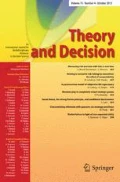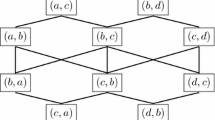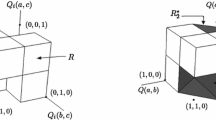Abstract
This paper discusses aspects of the theory of social choice when a nonempty choice set is to be determined for each situation, which consists of a feasible set of alternatives and a preference order for each voter on the set of nonempty subsets of alternatives. The individual preference assumptions include ordering properties and averaging conditions, the latter of which are motivated by the interpretation that subset A is preferred to subset B if and only if the individual prefers an even-chance lottery over the basic alternatives in A to an even-chance lottery over the basic alternatives in B. Corresponding to this interpretation, a choice set with two or more alternatives is resolved by an even-chance lottery over these alternatives. Thus, from the traditional no-lottery social choice theory viewpoint, ties are resolved by even-chance lotteries on the tied alternatives. Compared to the approach which allows all lotteries to compete along with the basic alternatives, the present approach is a contraction which allows only even-chance lotteries.
After discussing individual preference axioms, the paper examines Pareto optimality for nonempty subsets of a feasible set in a social choice context with n voters. Aspects of simple-majority comparisons in the even-chance context follow, including an analysis of single-peaked preferences. The paper concludes with an Arrowian type impossibility theorem that is designed for the even-chance setting.
Similar content being viewed by others
Bibliography
E. W. Adams, ‘Elements of a Theory of Inexact Measurement’, Philosophy of Science 32 (1965) 205–228.
K. J. Arrow, ‘A Difficulty in the Concept of Social Welfare’, Journal of Political Economy 58 (1950) 328–346.
K. J. Arrow, ‘Rational Choice Functions and Orderings’, Economica 26 (1959) 121–127.
K. J. Arrow, Social Choice and Individual Values, 2nd ed., New York 1963.
D. Black, The Theory of Committees and Elections, Cambridge 1958.
P. C. Fishburn, Utility Theory for Decision Making, New York 1970a.
P. C. Fishburn, ‘Intransitive Indifference in Preference Theory: A Survey’, Operations Research 18 (1970b) 207–228.
P. C. Fishburn, ‘A Location Theorem for Single-Peaked Preferences’, Journal of Economic Theory 4 (1972a) 94–97.
P. C. Fishburn, ‘Lotteries and Social Choices’, Journal of Economic Theory 5 (1972b) in press.
P. C. Fishburn, ‘Transitive Binary Social Choices and Intraprofile Conditions’, Econometrica (1973a) in press.
P. C. Fishburn, ‘Social Choice Functions’, mimeographed (1973b).
P. C. Fishburn, ‘Subset Choice Conditions and the Computation of Social Choice Sets’, mmimeographed (1973c).
K. Inada, ‘Majority Rule and Rationality’, Journal of Economic Theory 2 (1970) 27–40.
A. Mas-Colell, and H. Sonnenschein, ‘General Possibility Theorems for Group Decisions’, Review of Economic Studies 39 (1972) 185–192.
P. K. Pattanaik, ‘On Social Choice with Quasitransitive Individual Preferences’, Journal of Economic Theory 2 (1970) 267–275.
D. Scott, ‘Measurement Structures and Linear Inequalities’, Journal of Mathematical Psychology 1 (1964) 233–247.
A. K. Sen, and P. K. Pattanaik, ‘Necessary and Sufficient Conditions for Rational Choice under Majority Decision’, Journal of Economic Theory 1 (1969) 178–202.
K. A. Shepsle, ‘A Note on Zeckhauser's ‘Majority Rule with Lotteries on Alternatives’: The Case of The Paradox of Voting’, Quarterly Journal of Economics 84 (1970) 705–709.
R. Zeckhauser, ‘Majority Rule with Lotteries on Alternatives’, Quarterly Journal of Economics 83 (1969) 696–703.
Author information
Authors and Affiliations
Rights and permissions
About this article
Cite this article
Fishburn, P.C. Even-chance lotteries in social choice theory. Theor Decis 3, 18–40 (1972). https://doi.org/10.1007/BF00139351
Issue Date:
DOI: https://doi.org/10.1007/BF00139351




